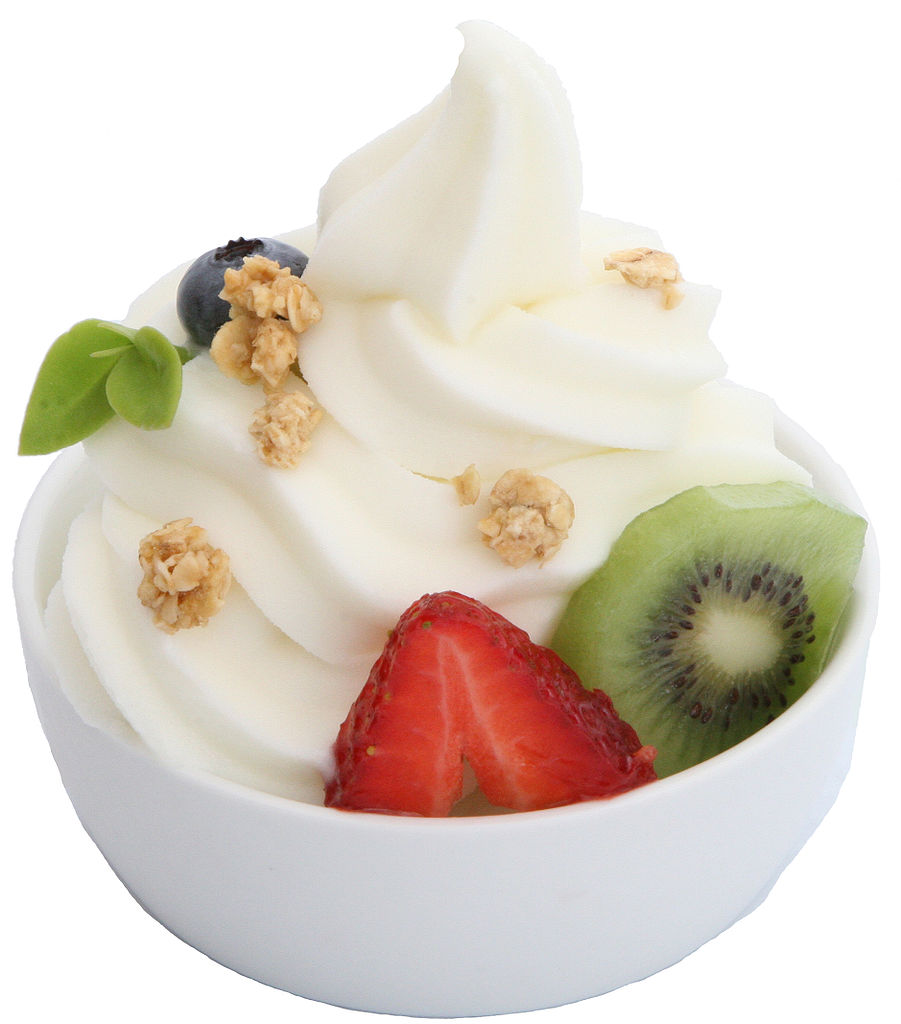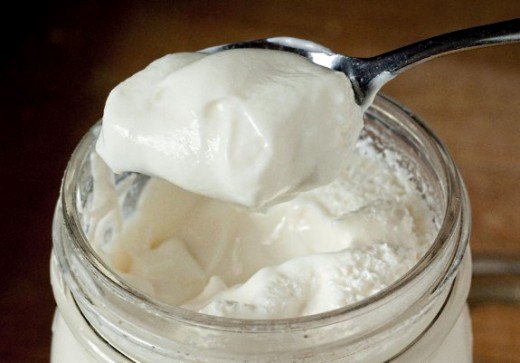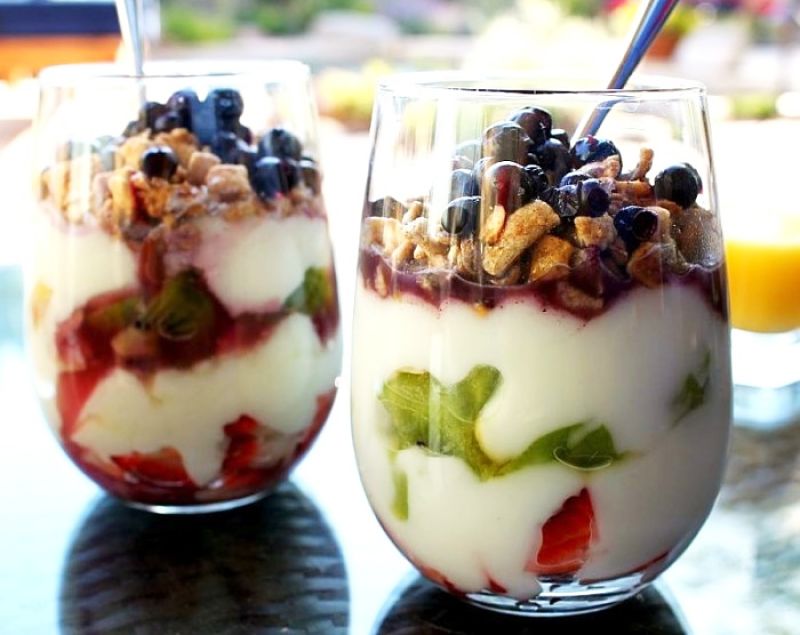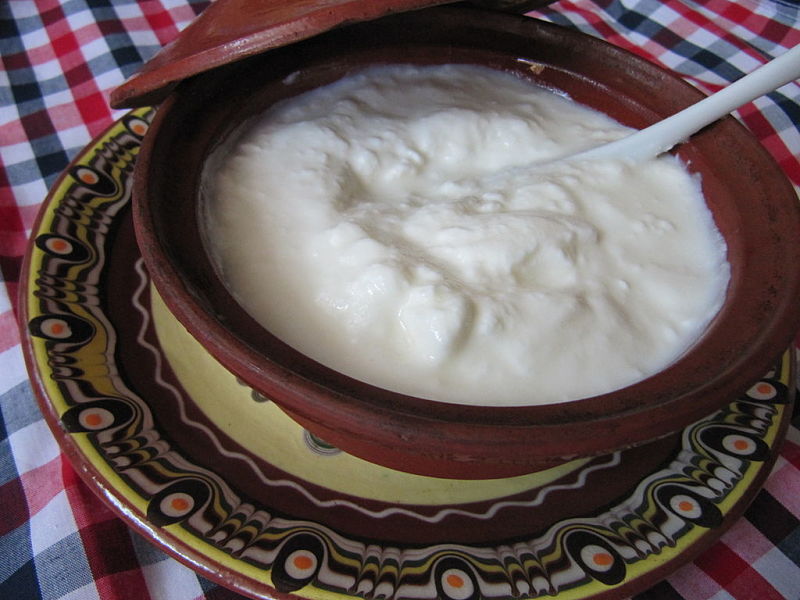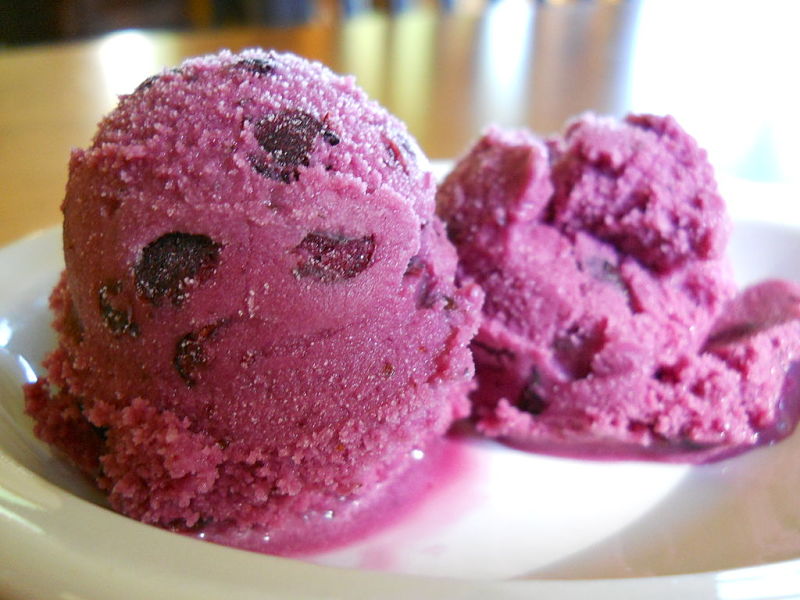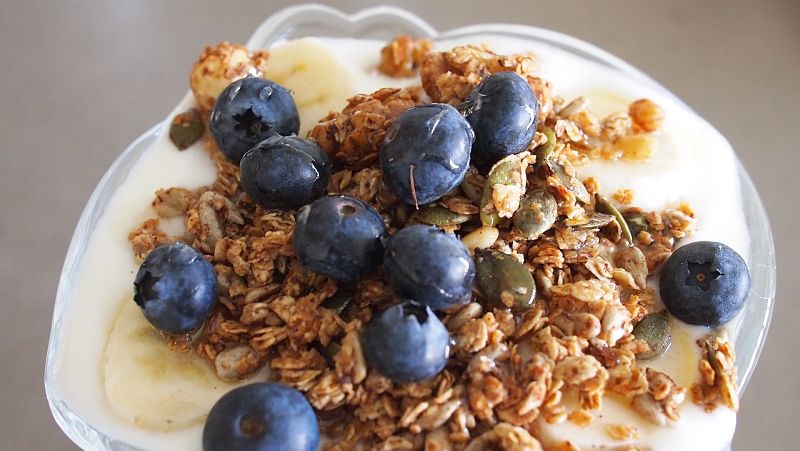How Healthy is Yogurt - Homemade vs Commercial Varieties Comparison Charts
People everywhere have eaten yogurt for centuries. It is regarded as a health food, but is this true and why? Is this really justified? Yogurt is made from cow's milk (or dairy-free soy milk), to which is added live, active bacteria. The most common bacteria are Streptococcus thermophilus and Lactobacillus bulgaricus, but Acidophilus and priobiotics organisms are also used.
The bacteria ferments the milk and changes some of the milk’s sugar (lactose) into lactic acid, which gives yogurt its characteristic acidic and tangy flavor and its custard-like texture and firmness.
But the bacteria have little or no impact on the fat in the milk. They add a little extra protein but don't significantly change the other macro nutrients (see the table below). There may be small changes in micro-nutrients, but any changes are small. Some of the water in the milk is removed and this concentrates the nutrients in the yogurt, in terms of nutrients per unit of weight.
So what is all the fuss about? Why do people by-pass the milk displays in the supermarket to get to the yogurt?
Yogurt is merely an attractive way to get all the nutrients in milk, in a convenient semi-solid form.
However, yogurt is nothing more than concentrated milk in the form of a gel.
Greek yogurt is a little more concentrated than standard yogurt, but it is still just thickened milk.
This article reviews the nutrition data for various types of commercial yogurts compared with homemade yogurt to help you make informed healthy choices.
|
Food Serving 8oz
|
Calories
|
Fat
|
Carbohydrates
|
Protein
|
|---|---|---|---|---|
|
Whole Milk Yogurt
|
149
|
8.0g
|
11.4g
|
8.5g
|
|
Whole Milk
|
146
|
7.9g
|
11.0g
|
7.9g
|
Which Yogurts are Healthier Choices and Why?
Yogurt is rightly promoted as a delicious healthy food. It is chock a block full of nutrients. One cup of yogurt provides almost 45% of the recommended daily allowance of Calcium and is an excellent source of other nutrients such as Protein, the B Group Vitamins, Potassium and Iodine. However, as shown in the table below the nutrients in yogurt are very similar to those in milk. The conclusion from this is that yogurt is essentially a concentrated milk in a form that many people like and enjoy. The bacteria that ferment the milk do not boost the major nutrients by very much and the vitamins and minerals are very similar. The fermentation by the bacteria do add many beneficial trace elements and antioxidants, but the benefits are small.
However, some yogurts are healthier than others. What things should you look for in making healthy choices?
Fat Content
Yogurts like milk, and other dairy products, vary due to the amount of milk fat they contain. Yogurt made from whole milk usually must contain at least 3.25% milk fat. Low-fat yogurts are made from reduced fat milks (2% and 1% levels of fat in milk). Fat-free yogurts are made from skim milk and contain virtually no fat. Removing the fat dramatically lowers the calories in the various types of yogurts. Most people think that the high-fat yogurts taste better, are creamier, and have a less watery consistency and are thicker. So reduced fat and fat free yogurts are the healthier choices in terms of weight control and dieting because they contain less fat. It follows that these reduced fat yogurts will have the lowest calories for plain yogurts.
The two tables below provide lists of common yogurt varieties with their major nutrient values. The yogurts are ranked with the lowest calorie ones at the top. One table compares yogurts for serving sizes of 100g, the other compared yogurts using their standard serving sizes (4-8oz).
The reduced fat yogurts have lower calories, less carbohydrate and slightly more protein than the standard yogurts. The best ones are those with no fat, made from skim milk.
Is Greek Yogurt Always a Healthier Choice?
Greek yogurt is an excellent alternative for people who want the thick texture and creamy taste a of full-fat yogurt with less calories and less fat. Greek yogurt comes in reduced fat and no-fat varieties, but all Greek yogurts have more protein and less lactose than equivalent standard yogurts and are generally thicker. Greek yogurt is made with an extra step in the processing. The liquid whey, produced from the fermentation, is strained out, reducing the moisture content and thereby concentrating the protein and other nutrients,in the yogurt.
This process also concentrates the fat in the yogurt and so Greek Yogurts are not lower in fat than standard yogurts.
Greek yogurts are essentially a more concentrated version of standard yogurts. Up to three times as much milk is needed to make Greek yogurt. Given this concentration, is important to choose fat-free and low-fat Greek yogurts to reduce the fat and calories.
Beware of the label “Greek style," which often means that standard yogurt has been articfially thickened with gelatine.
Pros and Cons of Greek Yogurt
Protein - Real Greek yogurt can have 13-18 grams of protein per serving, which is 2-3 times more protein than in traditional yogurts. This amount of protein is equivalent to that in 2 to 3 ounces of lean meat. A similar size serving of regular yogurt, has about 9 grams or protein, about half that in Greek yogurt.
Carbohydrates - Greek yogurt made with whole milk (6.1 g per 100g) has a little more carbohydrates than regular natural yogurt (3.4 g per 100g). This difference also applies for the reduced fat varieties. However, the differences depend on the bands and some Greek yogurt has less carbohydrate because some of the lactose disappears in the whey.
Fat - Don't assume that Greek yogurt, despite its reputation of being healthier, has less fat. Just 7 ounces (200 g) of many brands of full-fat Greek yogurt contains more than 16 grams of saturated fat (8% of weight). this amount of saturated fat is about 75% percent of your total daily allowance. This is more fat than in three candy bars. Some regular full-fat yogurt has only 8 grams of saturated fat in a similar size serving. So it pays to read the labels of Greek yogurt carefully
Calcium - Standard yogurt has about 3 times the amount of calcium as Greek yogurt, because some of the calcium is lost in the whey. However, Greek varieties of yogurt are still excellent source of calcium.
Sodium / Salt - Greek yogurt generally has half the the amount of sodium as regular yogurts.
Calories - Plain, reduced fat and non-fat versions of Greek yogurt have similar or slightly higher levels of calories than regular yogurt, despite the reduced carbohydrates
Texture - Greek yogurt is much creamier and thicker than regular yogurt because it's strained and concentrated, with loss of water.
Cooking - Greek yogurt is better for cooking as it does not curdle so easily when heated, compared with regular yogurt.
Greek Yogurt Selection Tips
Be careful to read the labels for Greek yogurts, despite their healthy reputation. A small 6 oz serve of certain brands can contain more than 300 calories, 3 teaspoons of added sugar and 14 grams of fat.
Some tips for making healthy choices for Greek Yogurts are:
- Look for non-fat, skim milk or low-fat Greek yogurt. A 6 oz or 8oz serving should have no more than 2.5 grams of total fat and 150 calories.
- A 6-8 oz serving of flavored Greek yogurt should not have more than 20 grams of sugar (check the label). Note that the sugar listed on unflavored and unsweetened yogurt is the sugar found naturally in the milk and is not added sugar.
Yogurt Additives and Flavorings to Look for on Labels
Flavorings - many flavors, including artificial ones are added to yogurts. Always check the labels.
Additional dairy products - This can include casein, nonfat dry milk solids and whey. They boost the protein and calcium but may also boost the fat and calories
Colorings - added for aesthetic reasons, may be harmful or trigger allergies
Gelatin and / or pectin - These are often added as thickeners and stabilizers. Vegetarians and vegan should be particularly wary of these animal derived additives.
Caloric Sweeteners - Many sweeteners are added including fruit juice, fruit juice concentrate, sugar, honey, maple syrup, high fructose corn syrup. Be careful that many low-fat and fat free yogurts have more sweeteners added to them than whole milk yogurts, to boost the taste and flavor and to compensate for the missing fat.
What to Look for on the Yogurt Label When Shopping
The following tips help to make it easier to choose healthy yogurt.
One 6-8 oz serving of yogurt should contain:
- Less than 180 calories, and less than 120 for those on diets.
- Less than 4 grams of Total Fat. Yogurts made from whole milk will have 7-9 grams of fat; low-fat yogurts have 2-4 grams of fat. Non-fat yogurts should have zero grams fat, but some may be added in the various things added to the yogurt.
- Less than 30 grams of sugar. About 12 grams of milk sugar will occur naturally in a 6-8 oz serving, which is not added sugar. That leaves an extra 18 grams of added sugar that is permitted.
- More than 5 grams of protein.
- More than 20% of your daily recommended allowance of calcium.
- More than 10% of your daily recommended allowance of vitamin D. Many yogurts are fortified with vitamin D and other vitamins, and have added calcium as well.
Homemade Yogurt The Healthiest Choice
The healthiest yogurt of all, is the one you make yourself, as you control exactly what goes into the yogurt. There is a sparsity of information on the nutrients in homemade yogurt, but the summary below will provide a guide.
- Yogurt made with 1 quart of low-fat milk, and 1/2 cup of skim milk powder added, to boost the protein levels, will yield a yogurt with 180 calories in a 1 cup serving.
- Yogurt made with 1 quart of non-fat milk plus 1/2 cup of skim milk powder, will yield a yogurt with 137 calories in a 1 cup serving.
Nutritional Facts for Homemade Yogurt (Serving Size 1 cup)
Whole Milk Yogurt
- Calories 149
- Total Fat 7.9 g
- Total Carbohydrate 11.7 g
- Protein 7.6 g
Skim Milk Yogurt
- Calories 89
- Total Fat 0.2 g
- Total Carbohydrate 13.0 g
- Protein 8.9 g
Comparison of the Major Nutrients in 100g of Various Types of Yogurt with Lowest Calorie Yogurts Listed First
|
Yogurt Type (100g serve)
|
Calories
|
Protein (g)
|
Fat (g)
|
Carbohydrate (g)
|
Calcium (mg)
|
|---|---|---|---|---|---|
|
Natural Low Fat
|
48
|
5.9
|
0.2
|
5.8
|
209
|
|
Fat Free BioDynamic Yoghurt
|
48
|
4.9
|
0.1
|
6.8
|
180
|
|
Fat Free Natural Yoghurt
|
52
|
5.3
|
0.1
|
7.4
|
170
|
|
Fat Free Natural Yoghurt
|
52
|
5.3
|
0.1
|
7.4
|
160
|
|
Yogurt plain skim milk
|
56
|
5.7
|
0.2
|
7.7
|
|
|
Natural Regular
|
67
|
4.7
|
4.4
|
4.7
|
171
|
|
Strawberry Low Fat
|
71
|
5.2
|
0.2
|
12.8
|
179
|
|
Whole Milk Natural Yoghurt
|
78
|
5.3
|
4.8
|
3.4
|
120
|
|
Whole Milk BioDyanmic Organic Yoghurt
|
83
|
4.3
|
4.6
|
6.3
|
180
|
|
Genuine Leben European Style Yoghurt
|
83
|
5.3
|
3.9
|
6.8
|
130
|
|
Strawberry Reduced Fat
|
83
|
4.9
|
0.9
|
14.5
|
160
|
|
Vanilla Regular
|
87
|
4.9
|
3.4
|
9.7
|
170
|
|
Low Fat BerryFruit Yoghurt
|
89
|
5.4
|
2
|
12.6
|
130
|
|
Strawberry Regular
|
91
|
4.9
|
2.8
|
12.4
|
171
|
|
Low Fat Strawberry Yoghurt
|
94
|
5.4
|
2
|
11.9
|
130
|
|
Low Fat Greek Natural Yoghurt
|
100
|
5.7
|
3
|
8.3
|
190
|
|
Premium Blend Natural Creamy Yoghurt
|
101
|
5.7
|
5
|
8.3
|
160
|
|
Low Fat Vanilla Yoghurt
|
105
|
5
|
2
|
16.8
|
160
|
|
Bush Honey BioDynamic Organic Yoghurt
|
106
|
4
|
4.3
|
12.8
|
190
|
|
Blueberry BioDyanmic Organic Yoghurt
|
112
|
5.2
|
4.6
|
12.5
|
93
|
|
Premium Fruits of the Forest Creamy Yoghurt
|
114
|
4.7
|
4.5
|
13.9
|
190
|
|
Premium Vanilla Creamy Yoghurt
|
121
|
5.4
|
4.7
|
14.5
|
170
|
|
Premium Strawberry Creamy Yoghurt
|
125
|
5.5
|
4.9
|
14.9
|
130
|
|
Greek Natural Yoghurt
|
129
|
3.8
|
10
|
6.1
|
85
|
|
Premium Honey Vanilla Creamy Yoghurt
|
129
|
5.6
|
4.4
|
16.8
|
130
|
|
Greek Vanilla Yoghurt
|
130
|
3.8
|
9
|
10.1
|
88
|
|
Greek Honey and Cinnamon Yoghurt
|
136
|
3.8
|
9
|
10.8
|
180
|
Comparison of the Nutrients in 100g of whole milk and 100g of yogurt made from whole milk with added Vitamin D
|
Nutrient
|
Units
|
Nutrients in 100g of Whole Milk Yogurt
|
Nutrient in 100g Whole Milk 3.25% milkfat, with added vitamin D
|
|---|---|---|---|
|
Energy
|
Cals
|
61
|
61
|
|
Protein
|
g
|
3.47
|
3.15
|
|
Total lipid (fat)
|
g
|
3.25
|
3.25
|
|
Carbohydrate
|
g
|
4.66
|
4.8
|
|
Fiber, total dietary
|
g
|
0
|
0
|
|
Sugars, total
|
g
|
4.66
|
5.05
|
|
Minerals
|
|
|
|
|
Calcium, Ca
|
mg
|
121
|
113
|
|
Iron, Fe
|
mg
|
0.05
|
0.03
|
|
Magnesium, Mg
|
mg
|
12
|
10
|
|
Phosphorus, P
|
mg
|
95
|
84
|
|
Potassium, K
|
mg
|
155
|
132
|
|
Sodium, Na
|
mg
|
46
|
43
|
|
Zinc, Zn
|
mg
|
0.59
|
0.37
|
|
Vitamins
|
|
|
|
|
Vitamin C
|
mg
|
0.5
|
0
|
|
Thiamin
|
mg
|
0.029
|
0.046
|
|
Riboflavin
|
mg
|
0.142
|
0.169
|
|
Niacin
|
mg
|
0.075
|
0.089
|
|
Vitamin B-6
|
mg
|
0.032
|
0.036
|
|
Folate
|
g
|
7
|
5
|
|
Vitamin B-12
|
g
|
0.37
|
0.45
|
|
Vitamin A, IU
|
IU
|
99
|
162
|
|
Vitamin E
|
mg
|
0.06
|
0.07
|
|
Vitamin D
|
g
|
0.1
|
1.3
|
|
Vitamin K
|
g
|
0.2
|
0.3
|
|
Fatty acids, total saturated
|
g
|
2.096
|
1.865
|
|
Fatty acids, total monounsaturated
|
g
|
0.893
|
0.812
|
|
Fatty acids, total polyunsaturated
|
g
|
0.092
|
0.195
|
|
Cholesterol
|
mg
|
13
|
10
|
|
Water
|
g
|
87.9
|
88.13
|
Major Nutrients in Common Types of Yogurts per Serving with Lowest Calorie Ones at the Top
|
Yogurt Standard Serves
|
Cals
|
Fat (g)
|
Protein (g)
|
Sugars (g)
|
Sweeteners and Additives
|
|---|---|---|---|---|---|
|
Light & Fit, non-fat, flavored
|
60
|
0
|
5
|
7
|
Sucralose
|
|
Greek yogurt, non-fat, plain (5.3 oz)
|
80
|
0
|
15
|
6
|
|
|
Light, No-Sugar Added, flavored
|
80
|
0
|
7
|
7
|
Sucralose
|
|
Light, non-fat, flavored
|
80
|
0
|
6
|
7
|
Aspartame
|
|
Various brands, non-fat, plain
|
85
|
0
|
9
|
12
|
|
|
Greek yogurt, non-fat, plain
|
100
|
0
|
18
|
7
|
|
|
Weight Watchers, low-fat, flavored
|
100
|
0.5
|
6
|
12
|
Fructose, Sucralose
|
|
Yoplait Light, non-fat, flavored
|
100
|
0
|
5
|
14
|
Aspartame, HFCS
|
|
Yoplait Light
|
100
|
0
|
5
|
14
|
Aspartame, corn syrup, red #40
|
|
Various Brand, low-fat, plain
|
105
|
3
|
8
|
12
|
|
|
Oikos (Vanilla, 5.3 oz)
|
110
|
0
|
15
|
11
|
|
|
Dannon All Natural, low-fat, flavored (4 oz)
|
120
|
1
|
5
|
19
|
Sugar
|
|
Light (8 oz)
|
120
|
0
|
7
|
15
|
Aspartame, corn syrup
|
|
Organic, fat-free, flavored
|
125
|
0
|
7
|
22
|
Sugar
|
|
No Fat
|
130
|
0
|
7
|
24
|
|
|
Stonyfield Farms Low fat
|
130
|
1.5
|
6
|
22
|
|
|
Organic, low-fat, flavored
|
140
|
2.5
|
7
|
21
|
cane juice
|
|
Greek yogurt, non-fat, plain (8 oz)
|
140
|
0
|
24
|
8
|
|
|
Fat Free
|
140
|
0
|
7
|
26
|
|
|
Yoplait Whips (4 oz)
|
140
|
2.5
|
5
|
21
|
corn syrup
|
|
Soy Yogurt, low-fat, flavored
|
150
|
2
|
4
|
18
|
cane juice
|
|
Organic Yogurt, low-fat, flavored (8 oz)
|
150
|
1.5
|
7
|
24
|
Maple syrup
|
|
Low Fat
|
150
|
2
|
6
|
25
|
|
|
All Natural (Vanilla)
|
150
|
2.5
|
7
|
25
|
|
|
Fruit on the Bottom
|
150
|
1.5
|
6
|
26
|
corn syrup
|
|
Organic Lowfat
|
150
|
2.5
|
7
|
21
|
|
|
Yoplait Original
|
170
|
1.5
|
5
|
27
|
corn syrup
|
|
Water Buffalo Milk
|
174
|
9
|
5
|
19
|
|
|
Cream Top
|
180
|
6
|
5
|
27
|
|
|
Organic Fat Free
|
180
|
0
|
9
|
33
|
|
|
Whole Milk
|
190
|
6
|
6
|
24
|
|
|
Yoplait Thick & Creamy Custard Style (vanilla)
|
190
|
3.5
|
7
|
28
|
corn syrup
|
|
Classic (8 oz)
|
230
|
2
|
7
|
42
|
corn syrup
|
|
Creme Savers (8 oz)
|
240
|
3.5
|
7
|
36
|
corn syrup, many additives
|
|
Fage Total Classic (7 oz)
|
260
|
20
|
12
|
6
|
|
More Images
